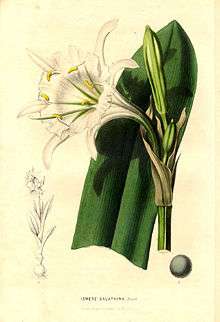Ismene (plant)
| Peruvian daffodil | |
|---|---|
 | |
| Ismene narcissiflora[1] | |
| Scientific classification | |
| Kingdom: | Plantae |
| Clade: | Angiosperms |
| Clade: | Monocots |
| Order: | Asparagales |
| Family: | Amaryllidaceae |
| Subfamily: | Amaryllidoideae |
| Genus: | Ismene Salisb. |
| Synonyms[2] | |
| |
Ismene, or Peruvian daffodil, is a genus of South American plants in the Amaryllis family.[3] The species are native to Peru and Ecuador and widely cultivated elsewhere as ornamentals because of their large, showy flowers.[4][5]
Ismene produces tender perennial bulbs bearing a strong resemblance to those of Hymenocallis, a genus into which Ismene had often been grouped in the past. However, its morphology differs from Hymenocallis in several significant ways: its vegetation, natural range, and chromosome number are all distinct.
Ismene can be difficult to grow in the United States.[6]
Species
A list of Ismene species and their geographic distribution is given below.[2]
- Ismene amancaes (Ruiz & Pav.) Herb – Peru
- Ismene × deflexa Herb. (Ismene festalis) I. longipetala × I. narcissiflora – Peru
- Ismene hawkesii (Vargas) Gereau & Meerow – Peru(Cusco)
- Ismene longipetala (Lindl.) Meerow (syn.: Elisena longipetala Lindl.) – southwestern Ecuador, northwestern Peru
- Ismene morrisonii (Vargas) Gereau & Meerow – Peru (Apurímac)
- Ismene narcissiflora (Jacq.) M.Roem. – south-central Peru
- Ismene nutans (Ker Gawl.) Herb. – Peru (Cusco)
- Ismene pedunculata Herb. – Peru
- Ismene ringens (Ruiz & Pav.) Gereau & Meerow – Peru
- Ismene sublimis (Herb.) Gereau & Meerow (syn.: Elisena sublimis Herb.) – Peru (La Libertad)
- Ismene vargasii (Velarde) Gereau & Meerow (syn.: Pseudostenomesson vargasii Velarde) – Peru
References
- ↑ illustration from Flore des serres et des jardins de l’Europe by Charles Lemaire and others. Gand [Gent], Louis van Houtte, 1849, volume 5, plate 440
- 1 2 Royal Botanical Gardens, Kew. World Checklist of Monocotyledons: Ismene . Accessed May 16, 2009.
- ↑ Herbert, William 1821. An Appendix: [General index to the Botanical magazine, vol. 43-48 containing a treatise on bulbous roots] page 45
- ↑ Jørgensen, P. M., M. H. Nee & S. G. Beck. (eds.) 2014. Catálogo de las plantas vasculares de Bolivia, Monographs in systematic botany from the Missouri Botanical Garden 127(1–2): i–viii, 1–1744.
- ↑ Brako, L. & J. L. Zarucchi. (eds.) 1993. Catalogue of the Flowering Plants and Gymnosperms of Peru. Monographs in systematic botany from the Missouri Botanical Garden 45: i–xl, 1–1286.
- ↑ Howard, Thad M. Bulbs for Warm Climates. Austin, Texas: University of Texas Press, 2001, pp 98–99.
External links
This article is issued from Wikipedia - version of the Thursday, May 21, 2015. The text is available under the Creative Commons Attribution/Share Alike but additional terms may apply for the media files.